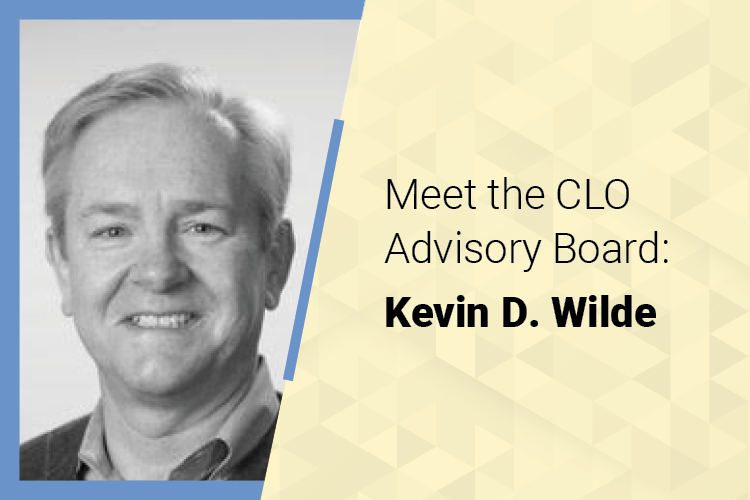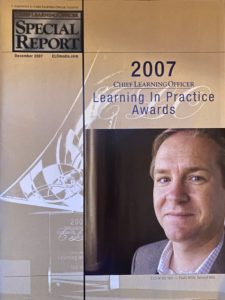 As we welcome the new year, Chief Learning Officer would like to recognize and highlight its Advisory Board, comprising individuals who have long and varied histories in the learning and development space. We recently sat down for a conversation with Kevin Wilde, an Executive Leadership Fellow at the University of Minnesota’s Carlson School of Business. He previously served as the vice president of organization effectiveness and chief learning officer at General Mills for more than 17 years. In 2007, he was named CLO of the Year.
As we welcome the new year, Chief Learning Officer would like to recognize and highlight its Advisory Board, comprising individuals who have long and varied histories in the learning and development space. We recently sat down for a conversation with Kevin Wilde, an Executive Leadership Fellow at the University of Minnesota’s Carlson School of Business. He previously served as the vice president of organization effectiveness and chief learning officer at General Mills for more than 17 years. In 2007, he was named CLO of the Year.
Chief Learning Officer: Where is your hometown?
Born in a little farming community, Hartford, Wisconsin.
CLO: How did you first become interested in learning and development?
Well, it goes back to Hartford. I can give you the date, the time and the location. I was 16 years old. I went to a weekend leadership retreat for business students in high school, and I was at the Midway Motor Lodge in Appleton, Wisconsin, for a classic three-day group dynamic training with facilitators, and I loved it. I’d never seen the topic of leadership and training and influence, and just became enamored with that whole idea about leaders making a big difference for team performance. And there’s good leaders and bad leaders, and you get better and you can learn. And then I remember looking, on day two, at the two facilitators thinking, I wonder if that’s a real job. I wonder if you get paid for it. And here we are, a 34-year corporate career in corporate America.
I’ve been fascinated with business, too. So it’s kind of a duality that I think makes for great chief learning officers. It’s being both equally passionate about your profession and its contribution, but at the same time, it doesn’t stand alone. It’s part of making a business work, making a nonprofit work, and those that I know and those who are on the board share both interests and passions.
CLO: What lessons did you learn in 2020 that you’ve brought with you into 2021?
The lesson I’ll carry forward is: If you’re going to deal with challenges and ambiguity — both in learning and leadership — I think it’s about stepping back and reflecting. Leaders are just crazy busy, and I don’t think that makes for good leadership in times of challenge. As Ron Heifetz Harvard once said, leaders have to get off the dance floor and get up to the balcony from time to time, take that bigger, higher point of view on things. What’s going on, what’s my contribution? How do I get back into the fray in a more productive way? So reflection, pause, getting perspective and energy, I think, are somethings I saw in 2020 and something I think will be important moving forward.
I think the one thing that 2020 made even harder is we’ve had our reflective locations taken away from us. Whether it’s a little conference room you hide in, or a coffee shop, or quiet time at home? Our reflection location has been taken away. You’ve got to find it again. We’re a serving profession, you know, you want to help other people and that could be draining too. So where’s your refuge, where’s your “getting away” spots?
CLO: What strengths or skills from the world of coaching do you think are equally important or useful in a learning leader?
Curiosity and questions, and I think that feeds reflection. One of the other consultants I really enjoy tracking is Jason Womack and he’s doing his Ph.D., in fact, on reflection or self-reflecting. His point of view, which I think it was a great one, is that it’s certainly your practice or it’s your location. He says the thing that pulls you into reflection is owning a set of powerful questions that just draw you in. And so to me, a great coach and clearly on the coach’s part is asking great questions. And I think for self-coaching, what I would say for 2021 is what are the two or three reflection questions that would really cause you to get into reflection mode?
CLO: How do you enjoy spending your time outside of work?
I love physical adventures. I used to be a marathoner, ultra-marathoner, all of that. I just love hiking, so one thing I do now is, with a bunch of buddies, every fall, we do a one-day crossing of the Grand Canyon. It’s a mile deep, and takes you all day and it’s 100 degrees. Some years we do a double, so we go out and back, and it’s about 50 miles round-trip. I think back to the locations that have been taken away from us for reflection. And the thing that I’ve found is Mother Nature — could be New York City, could be walking around Central Park — but anywhere there’s nature gives us sanity. It just brings you back. It centers you.
CLO: What book, either audio or physical, or podcast has gotten you through 2020 and the pandemic?
The thing that has really been inspiring me lately is the work of Cal Newport. Cal actually spoke at [CLO] Symposium a few years ago. He’s got a great podcast called Deep Questions. Here’s his premise: In a highly competitive marketplace, the only sustaining skill you have as a professional is how quickly you can learn hard things. One of his books is called “Digital Minimalism” — I’ve been very inspired by it. He’s got a 30-day digital decluttering process I’m going through.

CLO: In your opinion, what are some components of a robust L&D program?
There’s some evergreen things and there are some emerging things. Obviously be great at what you do. I think that the standards of what employers want are going up, I think what businesses need are going up and I think our tools have gotten so much better.
Two, be extraordinarily relevant to the business and the people who are stakeholders. Not average, not “I want to sit at your table.” You’ve got to have incredible insight on the business and be able to say “yes” and hold yourself accountable for getting results that matter for the business. A combination of your professional craft at the highest performance level and your insight on the business and your connection to the key stakeholders is incredibly high.
The third one I would add is staying curious on the edge of what’s going on. So, for example, I think one of the edges is this contrast of technology and community. I think the digitization of business and the digitization of learning are continuing at a rapid pace using artificial intelligence. You have to stay on top of that stuff. At the same time, I think people are missing community. People are missing connecting to people in meaningful ways, and I think we’ve got to be able to deliver both. I think that fits the culture, that fits the diversity and inclusion and equity. I teach an executive MBA course on leadership at the University of Minnesota, and I’ve been impressed with how we’ve been able to accomplish so much with asynchronous stuff, but at the same time, people learn together.
CLO: What advice do you have for CLOs or fellow learning leaders as they take on 2021?
Well, if you haven’t taken [CLO’s] Accelerator program, take the Accelerator program. Also — I work on reflection, which has gone into a website, The Coachable Leader. And then thirdly — and this is my theme of 2021 — if I had to be a forecaster, this would be the prediction: This is a year of reset. I think people are waking up after 2020, saying, “You know what? To whatever great things you’re going to get back to, the kind of world I want, I don’t want to show up the same, nor do I want the world to be the same.”
On a personal level, the reset is, again, what skills do I want to build, what kind of passions, and where do I want to practice my craft? The CLO brings a lot of that to life.
And, here’s my last one: I think the better businesses are resetting their strategy of how they’re going to win, which will require a different workforce. So we’re going to be resetting the workforce expectations, and I think L&D can play a leading role in answering that question. If you’re proactive, you can be part of the solution. If you’re reactive, it’s going to run you over.
This article has been edited for brevity.














